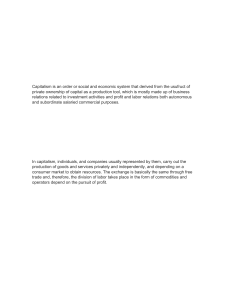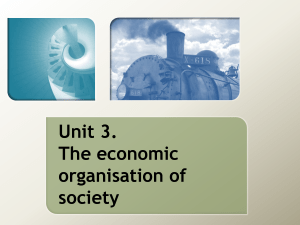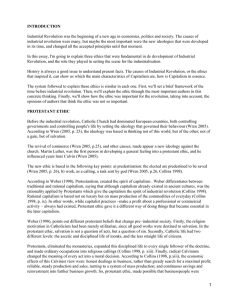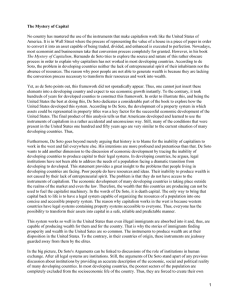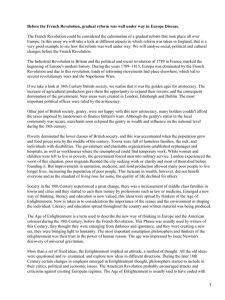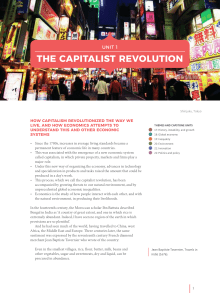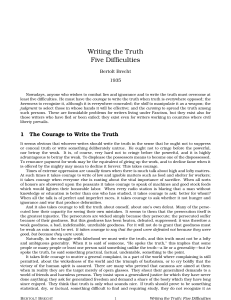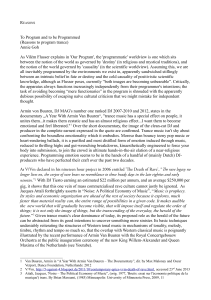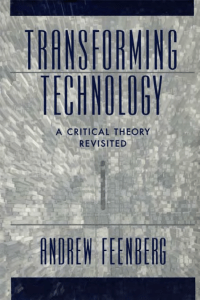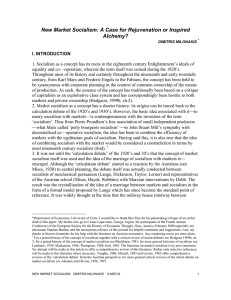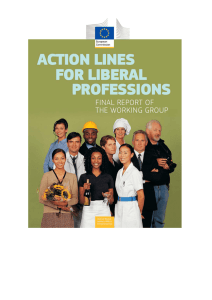Goodbye To All That
Anuncio
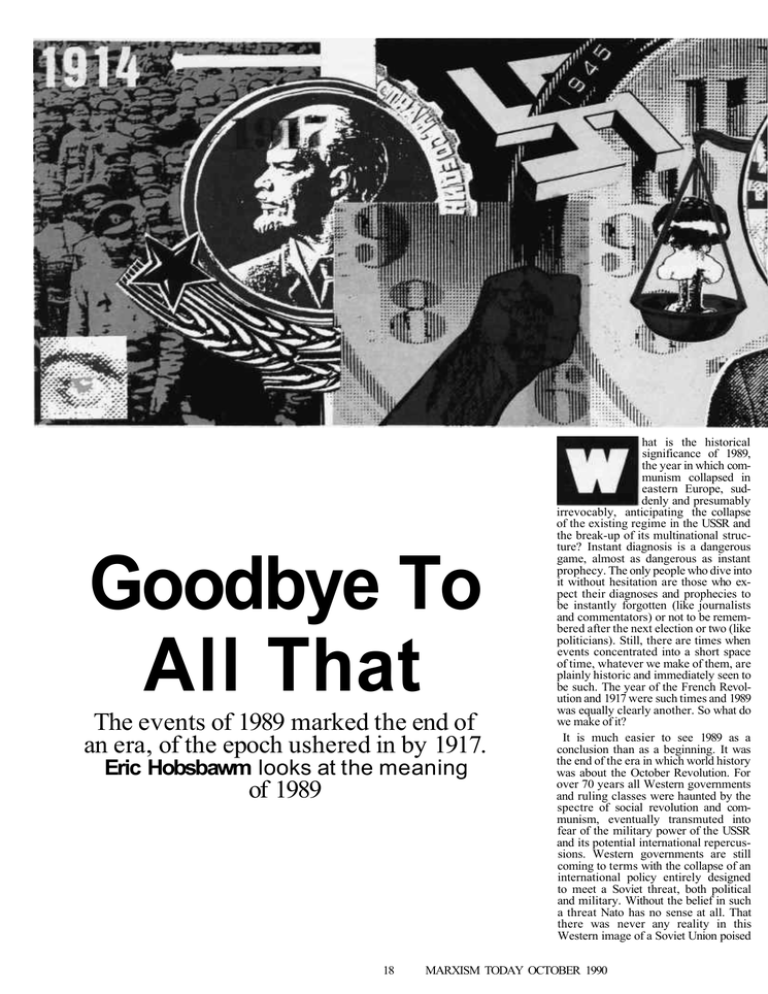
Goodbye To
All That
The events of 1989 marked the end of
an era, of the epoch ushered in by 1917.
Eric Hobsbawm looks at the meaning
of 1989
18
hat is the historical
significance of 1989,
the year in which communism collapsed in
eastern Europe, suddenly and presumably
irrevocably, anticipating the collapse
of the existing regime in the USSR and
the break-up of its multinational structure? Instant diagnosis is a dangerous
game, almost as dangerous as instant
prophecy. The only people who dive into
it without hesitation are those who expect their diagnoses and prophecies to
be instantly forgotten (like journalists
and commentators) or not to be remembered after the next election or two (like
politicians). Still, there are times when
events concentrated into a short space
of time, whatever we make of them, are
plainly historic and immediately seen to
be such. The year of the French Revolution and 1917 were such times and 1989
was equally clearly another. So what do
we make of it?
It is much easier to see 1989 as a
conclusion than as a beginning. It was
the end of the era in which world history
was about the October Revolution. For
over 70 years all Western governments
and ruling classes were haunted by the
spectre of social revolution and communism, eventually transmuted into
fear of the military power of the USSR
and its potential international repercussions. Western governments are still
coming to terms with the collapse of an
international policy entirely designed
to meet a Soviet threat, both political
and military. Without the belief in such
a threat Nato has no sense at all. That
there was never any reality in this
Western image of a Soviet Union poised
MARXISM TODAY OCTOBER 1990
to overrun or nuke the 'free world' at a
moment's notice only proves how deep
the fear of communism was. For over 70
years international politics has been
waged by one side as a crusade, a cold
war of religion, with a brief intermission for confronting the more real
dangers of the Berlin-Tokyo axis.
On the other side it had long been clear
that it was no such thing. It is true that
Lenin and the Bolsheviks saw October
as the first phase of the world revolution which would overthrow all capitalism. The early generations of communists (including the present writer)
still joined what we thought of as a
disciplined army to fight and win the
world revolution. Nikita Khrushchev,
the only peasant ever to rule Russia (or
for that matter any important state),
still sincerely believed that communism would bury capitalism, though not
by revolution. And the dramatic extension of both anti-imperialist and communist revolution after world war two
seemed at first sight to confirm the
prospect.
Nevertheless, it is clear that from the
early 1920s onwards the USSR's policy
was no longer designed to achieve
world revolution, although Moscow
would certainly have welcomed it. In
the era of Stalin, who actively discouraged bids for power by any communist
party and distrusted communist parties
who made revolution against his advice,
Soviet policy was cautious and essentially defensive, even after the stunning
victories won by the Red Army in world
war two. Khrushchev, unlike Stalin,
took risks and lost his job for it. Whatever Brezhnev wanted to do, spreading
communism all over the world, let alone
'Those of us
who believed
that the
October
Revolution
was the gate
to the future
of world
history have
been shown
to be wrong'
invading the West, were neither within
his power nor on his agenda.
After 1956, when the international
communist movement visibly began to
disintegrate, various groups outside the
Moscow orbit claimed the original
marxist-leninist or at least the worldrevolutionary inheritance. On a world
scale, neither the 57 varieties of trotskyists, maoists, revolutionary marxists,
neo-anarchists and others, nor the states
nominally committed to their support,
amounted to anything. Even within particular countries their impact, except
for brief moments, was usually marginal. The most systematic attempt to
spread revolution along these lines, the
Cuban revolutionary export drive of the
1960s, did not even begin to look like
getting anywhere. Unlike the first
world revolutionary wave of 1917-19
and the second wave which followed
world war two, the third wave, coinciding with the world crisis of the 1970s,
even lacked a unified ideological tradition or pole of attraction. The most
important social upheaval of this period
by far, the Iranian revolution, looked to
Muhammad and not to Marx. The communists, though central to the ending of
the last hold-overs of the European
fascist era, were soon side-lined in postSalazar Portugal and post-Franco Spain
by what claimed to be social democrats.
But if there was no significant movement to overthrow capitalism worldwide, revolutionaries still hoped that its
contradictions and those of its international system made it vulnerable perhaps one day fatally vulnerable and that marxists, or at any rate socialists, would provide the alternative to it.
If communist power did not look like
19
expanding much except in small Latin
American countries and, nominally,
African states of little international significance, the world was still divided
into the 'two camps', and any country or
movement which broke with capitalism
and imperialism tended to gravitate or
to be notionally absorbed into the socialist sphere. Ex-colonies which did not
claim in some sense to be 'socialist' or
which did not look in some way to the
Eastern model of economic development were rare birds indeed in the generation or two after 1945. In short, world
politics could still be seen, even on the
left, as the working out of the consequences of the October Revolution.
ll this is now over. Communism in eastern Europe has dissolved or is
dissolving. So is the USSR
as we have known it. Whatever China
will be like when the last of the Last
March generation is dead, it will have
little to do with Lenin and less with
Marx. Outside the former regions of
'real socialism' there are probably not
more than three communist parties with
genuine mass support (Italy, South
Africa and the regionally concentrated
CP-Marxist of India), and one of them
wants to rejoin international social democracy as fast as it can. We are seeing not
the crisis of a type of movement, regime
and economy, but its end. Those of us
who believed that the October Revolution
was the gate to the future of world
history have been shown to be wrong.
What was wrong about Lincoln Steffens' 'I have seen the future and it
works', was not that it failed to work. It
worked in a rackety way, and it has
great and in some cases astonishing
A
MARXISM TODAY OCTOBER 1990
achievements to its credit. But it turned
out not to be the future. And when its
time came, at least in eastern Europe,
everyone including its rulers knew this,
and it collapsed like a house of cards.
How did it happen that the fear, or the
hope, or the mere fact of October 1917
dominated world history for so long,
and so profoundly, that not even the
coldest of cold-war ideologists expected
the sudden, virtually unresisted disintegration of 1989? It is impossible to
understand this, ie, the entire history of
our century, unless we remember that
the old world of global capitalism and
bourgeois society in its liberal version
collapsed in 1914, and for the next 40
years capitalism stumbled from one
catastrophe to the next. Even intelligent
conservatives would not take bets on its
survival.
A simple list of the earthquakes that
shook the world during this period is
enough to make the point: two world
wars, followed by two bouts of global
revolution, leading to the wholesale collapse of old political regimes and the
installation of communist power, first
over one-sixth of the world's surface
and later over one-third of the world's
population; plus the dissolution of the
vast colonial empires built up before
and during the imperialist era. A world
economic crisis brought even the strongest capitalist economies to their knees,
while the USSR seemed to be immune to
it. The institutions of liberal democracy
virtually disappeared from all but a
fringe of Europe between 1922 and 1942
as fascism and its satellite authoritarian
movements and regimes rose. But for the
sacrifices of the USSR and its peoples,
Western liberal capitalism would probably have succumbed to this threat
and the contemporary Western world
(outside an isolated USA) would now
consist of a set of variations on authoritarian and fascist regimes rather than a
set of variations on liberal ones. Without
the Red Army the chances of defeating
the Axis powers were invisible. Perhaps
history, in its irony, will decide that the
most lasting achievement of the October
Revolution was to make the 'developed
world' once again safe for 'bourgeois
democracy'. But that is of course to
assume that it will remain safe....
F
or 40 years capitalism lived
through an era of catastrophe,
vulnerability and constant
instability, with a future that
seemed entirely uncertain. Moreover,
during this era it faced, for the first
time, a system claiming to provide an
alternative future: socialism. In the
most traumatic years of this era, the
early 1930s, when the very mechanism
of the capitalist economy, as hitherto
known, apparently ceased to function
and Hitler's triumph in Germany dealt a
body-blow to liberal institutions, the
USSR appeared to make its most dramatic advances. In retrospect it seems
amazing that liberal and conservative
politicians (not to mention those of the
Left) went to Moscow to learn lessons
'For the time
being there
is no part of
the world
that credibly
represents an
alternative
system to
capitalism'
('plan' became a buzz-word across the
Western political spectrum), or that
even socialists could have sincerely believed that their economies would outproduce the Western system. In the
days of the Great Slump it did not seem
absurd at all.
On the contrary, what was entirely
unexpected, not least by governments
and businessmen anxious about postwar ruin and possible depressions, was
the extraordinary surge of global economic growth after the second world
war. This turned the third quarter of the
present century into the all-time golden
age of capitalist development: the 'Thirty Glorious Years' in the French phrase.
So unexpected was it, that the existence
of this super-boom was only slowly recognised, even by those who benefited
from it - 'You never had it so good' did
not become a British political slogan
until 1959 - and was fully recognised
only in retrospect, after the boom had
come to an end in the early 1970s.
Initially it did not look like a specifically
capitalist triumph, since both 'camps' at least in Europe and Asia - were busy
recovering from the ravages of war,
and the rate of growth of the socialist
economies during this period was generally considered to be as fast, if not
faster, than the rest.
However, from some time in the 1960s
it became patent that capitalism had
surmounted its era of catastrophe, although it was not yet so evident that the
socialist economies were running into
serious trouble. Nevertheless, in material and technological terms the
socialist camp was clearly no longer in
the race.
Somehow the heritage of the age of catastrophe was surmounted, or at least
buried. Fascism and its associated
forms of authoritarianism were destroyed and liquidated in Europe, and
variants of liberal democracy once
again became the normal political regimes in the metropolitan countries. (In
what now came to be called the Third
World this was notably not the case.)
The colonial empires of the imperialist
era, notoriously the Achilles heel of
their metropoles, were politically decolonised. Both processes, decisively
initiated in 1945-48, were essentially
completed in the 1970s.
War, which had twice swept through
the developed world, and especially Europe, was eliminated from this region,
partly by being transferred to the Third
World. There the years from 1945 to 1990
have probably seen rather more bloodshed and destruction than any other
period of comparable length in modern
history. Peace in the developed world
was probably not maintained simply by
the fear of nuclear war, and by mutual
deterrence, ie, in practice by the deterrent effect of the Soviet nuclear arms
on the USA after the end of the shortlived and extremely dangerous period
of US nuclear monopoly1.
It was also due to three factors: a world
politics simplified into a game for two
20
players; the Yalta agreement which in
practice demarcated each superpower's
zone in Europe, from which neither
tried to break out; and, eventually, the
unquestionable prosperity and stability
of the developed capitalist countries
which eliminated the possibility, let
alone the likelihood, of social revolution
in this region. Outside Europe major
wars (without nuclear weapons) were
not, of course, eliminated.
ost important of all, capitalism learned the domestic lessons of its age of
crisis, both in economics
and in politics. It gave up the sort of
free-market liberalism which Reaganite America and Thatcherite Britain, alone among developed Western
countries, have tried to restore in the
1980s. (Both, not coincidentally, are
capitalist economies on the slide.) The
original stimulus for this change was
almost certainly political. Keynes himself made no bones about the fact that
his aim was to save liberal capitalism.
After 1945 the enormous expansion of
the socialist 'camp' and the potential
threat it presented concentrated the
minds of Western governments wonderfully, not least on the importance of
social security. The intention of this
deliberate break with free-market capitalism was not only to eliminate mass
unemployment (which was then regarded as automatically likely to radicalise its victims) but also to stimulate
demand. From the mid-1950s it became
clear that both these aims were being
achieved. Expansion and prosperity
made welfare capitalism affordable. It
reached its peak in the 1960s, or even in
the 1970s, before a new world crisis
provoked a fiscal backlash.
Economically, therefore, the turn to a
Keynesian mixed economy paid off dramatically. Politically it rested on the
deliberate partnership between capital
and organised labour under the benevolent auspices of government, which is
now known and usually slagged off as
'corporatism'. For the age of catastrophe had revealed three things.
First, that the organised labour movement was a major and indispensable
presence in liberal societies. Indeed
sometimes, as in central Europe after
the 1918 defeat, it emerged briefly as
the only state-sustaining force to survive the collapse of empires.
Second, it was not Bolshevik. (Comintern exclusivism actually forced most
socialist sympathisers with the October
Revolution back into the reformist
camp, and kept communists in a minority in the countries of the old Second
International until the period of antifascist resistance.)
Third, that the only alternative to buying working-class loyalty with (expensive) economic concessions was to put
democracy at risk. For this reason, even
the fanatical economic neo-liberalism
of Thatcher's type has so far not
actually been able to dismantle the welfare state, or to cut down its expense.
The political consequences of leaving
MARXISM TODAY OCTOBER 1990
populations naked to fend for themselves in the blizzards of genuine neoliberal capitalism are too unpredictable
to risk - except by graduates of business schools advising Third World and
formerly socialist countries from local
Hilton hotels. (Even the International
Monetary Fund has discovered that
there are limits to the sacrifices that
can be imposed on remoter peoples.)
However, social Keynesianism, New
Deal policies and 'corporatism' visibly
bore the birthmarks of the era of capitalist troubles. The world capitalism
that emerged from the 'Thirty Glorious
Years' and (in the developed world)
sailed through the economic gales of the
1970s and 1980s with surprisingly little
difficulty, was no longer in trouble. It had
entered a new technological phase. It had
restructured the world into a substantially transnational economy with a new
international division of production.
The two main pillars of the socialKeynesian era, economic management
by nation-states and a mass industrial
working class, especially one organised
by traditional labour movements, did not
so much crumble as slim down. Neither
was any longer capable of carrying such
heavy loads as before. Both Keynesian policies and the (mainly socialdemocratic) parties most firmly identified with them were clearly in difficulties, even though the essential foundation
of any flourishing capitalism remained
as before: a mixed public-private 'social
market economy' (ie, profits plus a welfare state and social rights), an interweaving of private enterprise, public
enterprise and a good deal of public
control. To this extent the past 15 years
have seen the fading away of another
part of the heritage of the era from 1914
to the early 1950s.
owever, a major symptom
and product of that era remained: the third of the
world under 'really existing socialism'. It did not 'fail' in any
absolute sense, in spite of the growing
sense that these economies required
fundamental reforms, and the failure of
the various attempts to reform them.
Probably people in the USSR and in
most of eastern Europe were better off
in the 1970s than ever before. But three
things were increasingly clear.
First, socialism was incapable of moving fully into, let alone generating, the
new hi-tech economy, and was therefore destined to fall ever further behind. To have constructed the economy
of Andrew Carnegie was no good unless
one could also advance further into the
economy of IBM - or even of Henry
Ford, for socialism signally failed to
achieve the mass production of consumer goods.
Second, in the society of global communications, media, travel and transnational economy, it was no longer possible to insulate socialist populations
from information about the nonsocialist world, ie, from knowing just
how much worse off they were in material terms and in freedom of choice.
'Europe has
returned to a
state of
instability,
as between
the wars.
And the new
instability, as
the Middle
Eastern crisis
proves, is
not only
European,
but global'
Third, with the slowing down of its rate
of growth and its increasing relative
backwardness, the USSR became economically too weak to sustain its role as
a superpower, ie, its control over eastern Europe. In short, Soviet-type
socialism became increasingly uncompetitive and paid the price. What is
worse, it has so far proved incapable of
adapting and reforming. In this it
differs from Chinese socialism, whose
economic reforms succeeded spectacularly - at least in the rural sector - but
at the cost of seriously worsening social
conditions; and which has so far fended
off political unrest in the cities because
the countryside is still predominant.
Nor do these weaknesses apply to
social-democratic mixed economies.
The Scandinavian countries and Austria have remained in the vanguard
of economic and technical development and prosperity while keeping unemployment down and maintaining
their ambitious welfare system in
good order.
Who has won? Who has lost? And what are
the prospects? The winner is not capitalism as such, but the old 'developed
world' of the OECD countries2, which
form a diminishing minority of the
world's population - say 15% today as
against 33% in 1900. (The so-called
Newly Industrialising Countries, or
NICs, in spite of striking advances, still
average only between a quarter and a
third of the OECD's average per capita
GDP.) The bulk of the world's population, whose governments have pursued economic development since 1917
if not before, without communist regimes, hardly encourage shouts of
triumph from the Adam Smith Institute.
Unlike the former 'socialist camp', the
non-socialist world contains regions
that have actually reverted to local subsistence economy and famine. Moreover,
within 'developed' capitalism it is certainly not the Thatcherite free-market
Utopia that has won. Even its intellectual appeal has been limited to ultras in
the West and to despairing intellectuals
in the East who hope that the South Pole
is warmer that the North Pole because it
is its polar opposite.
Nevertheless, it is undeniable that
capitalism, as reformed and restructured during its crisis decades, has once
again proved that it remains the most
dynamic force in world development. It
will certainly continue to develop, as
Marx predicted that it would, by generating internal contradictions leading to
periodic eras of crisis and restructuring. These may once again bring it close
to breakdown, as happened earlier this
century. However, the current such period of crisis and restructuring has
brought disaster to parts of the Third
World, and to the Second World, but not
to the First.
Who or what has lost, apart from the
regimes of 'really existing socialism',
which plainly have no future? The main
effect of 1989 is that capitalism and the
21
rich have, for the time being, stopped
being scared. All that made Western
democracy worth living for its people social security, the welfare state, a high
and rising income for its wage-earners,
and its natural consequence, diminution
in social inequality and inequality of
life-chances - was the result of fear.
Fear of the poor, and the largest
and best-organised block of citizens
in industrialised states - the workers;
fear of an alternative that really
existed and could really spread,
notably in the form of Soviet communism. Fear of the system's own
instability.
his concentrated the minds of
Western capitalists in the
1930s. Fear of the socialist
camp, so dramatically extended after 1945 and represented by
one of two superpowers, kept them concentrated after the war. Whatever Stalin did to the Russians, he was good for
the common people of the West. It is no
accident that the Keynes-Roosevelt way
of saving capitalism concentrated on
welfare and social security, on giving
the poor more money to spend, and on
that central tenet of postwar Western
policies - and one specifically targeted
at the workers - 'full employment'. As
it happens this bias against extreme
inequality served capitalist development well. The showpiece countries of
postwar economic growth, Japan, South
Korea and Taiwan, have enjoyed unusually egalitarian income distributions until recently, partly assured by
postwar land reforms by occupying powers determined to counteract revolution.
Today this fear, already reduced by
the diminution of the industrial working
class, the decline of its movements and
the recovery of self-confidence by a
flourishing capitalism, has disappeared.
For the time being there is no part of the
world that credibly represents an alternative system to capitalism, even
though it should be clear that Western
capitalism represents no solutions to
the problems of most of the former
Second World, which is likely to be
largely assimilated to the condition of
the Third World. Why should the rich,
especially in countries such as ours,
where they now glory in injustice and
inequality, bother about anyone except
themselves? What political penalties do
they need to fear if they allow welfare
to erode and the protection of those who
need it to atrophy? This is the chief
effect of the disappearance of even a
very bad socialist region from the globe.
It is too early to discuss long-term
prospects for the future. What a Hungarian historian has called 'the short 20th
century' (1914-1990) has ended, but all
we can say about the 21st is that it will
have to face at least three problems,
which are getting worse: the growing
width of the gap between the rich world
and the poor (and probably within the
rich world, between its rich and its
poor); the rise of racism and xenophobia; and the ecological crisis of the
globe which will affect us all. The ways
T
MARXISM TODAY OCTOBER 1990
in which they can be dealt with are
unclear, but privatisation and the free
market are not among them.
Among the short-term problems, three
stand out. First, Europe has returned to
a state of instability, as between the
wars. Hitler's triumph briefly produced
a 'German order'. Yalta and superpower duopoly produced 45 years of
European stability, which are now at an
end. Since Russia and the USA have
ceased to be able, jointly, to impose
their order as before, the only alternative hegemonic force on our continent,
as between the wars, is Germany. That
is what everyone is afraid of, not
because 'Germans are Germans' there will certainly be no return to
Hitler - but because German nationalism has dangerous unfinished business:
the recovery of the large territories lost
in 1945 to Poland and the USSR.
And the new instability, as the Middle
Eastern crisis proves, is not only European, but global. No longer held back by
the fear that a sudden move by one
superpower or its associated states into
the other's zone of influence would provoke a direct confrontation between East
and West, adventurism is once again on
the agenda. What kept the world order in
being since 1945, including most of the 60
sovereign mini-states with populations of
less than 2m (the Gulf is full of such
political artifacts), was largely the fear
of global war. But if the nuclear world
holocaust is no longer an immediate
danger, a world in which medium-sized
gangsters no longer hesitate to take over
small neighbouring territories is not
safer from war than before. Nor is one
in which a superpower rushes blithely
into the Middle Eastern explosives store
ready to fire, knowing that those whose
missiles could reach New York will no
longer do the same. Is it an accident that,
within barely half a year of the collapse
of the Warsaw Pact, we find ourselves
facing a major war crisis?
he second development reinforces this world instability.
For central and eastern Europe are relapsing into something like the post-first world war zone
of nationalist rivalries and conflicts. In
fact all the burning problems of this
kind date back to the inter-war years.
They posed no major headaches before
19143. What makes the situation more
explosive is that today the last of the
pre-1914 multinational empires is in disintegration. For it was the October Revolution which saved the tsar's domains
from the fate of the Hapsburg and Ottoman empires and gave them another 70odd years of life as the USSR.
The dangers of war in this situation are
serious. Already the demagogues of
Great Russian nationalism are talking
lightly about a possible 'civil war in
which our situation would be a nuclear
one'4. One day soon we may look back
with melancholy on the days when nuclear triggers were under the control of
the two superpowers.
Lastly, there is the instability of the
T
23
'One day
soon we
may look
back with
melancholy
on the days
when nuclear
triggers were
under the
control of
the two
superpowers'
political systems into which excommunist states have rushed: liberal
democracy. So did the new states in
1918. Twenty years later only Czechoslovakia was still democratic. The prospects for liberal democracy in the region must be poor, or at least uncertain.
And the alternative, given the unlikelihood of a return to socialism, will most
likely be military or right-wing or both.
So, let us wish eastern Europe and the
world luck as it ends an old era and is
about to enter the 21st century. We shall
need luck. And let us commiserate with
Mr Francis Fukuyama, who claimed
that 1989 meant 'the end of history', and
that henceforth all would be plain
liberal, free-market sailing. Few prophesies look like being more short-lived
than that one.
1 The most dangerous period since the war was
undoubtedly 1946-1953, during which Attlee specially
travelled to Washington to dissuade Truman from
using nuclear bombs in Korea. Probably the only time
when the USSR appears to have seriously believed
that war might be imminent was 1947-50.
2 If we leave out Turkey, Greece, Spain and Portugal, which were included only on political grounds,
the OECD consists of Austria, Belgium, Canada,
Denmark, Finland, France, Iceland, Ireland, Italy,
Japan, Luxembourg, the Netherlands, Norway, Sweden, Switzerland, the UK, the US and West Germany.
Australia is partly associated.
3 Among the problems which did not exist or were of
very minor political significance before 1914: Croats
versus Serbs; Serbs versus Albanians; Slovaks versus Czechs; the Transylvanian imbroglio; the three
Baltic nationalisms; Byelorussia; Moldavia; Azerbaijani nationalism; not to mention the former German
territories east of the Oder-Neisse line.
4 Edward Mortimer, 'Bolshevism At The Mercy Of
The Republics', Financial Times, July 31,1990.
MARXISM TODAY OCTOBER 1990
